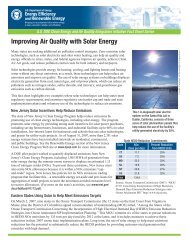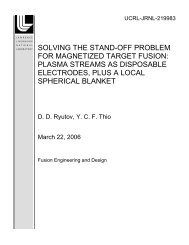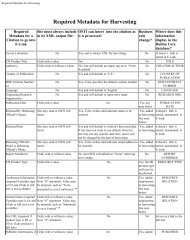Glass Melting Technology: A Technical and Economic ... - OSTI
Glass Melting Technology: A Technical and Economic ... - OSTI
Glass Melting Technology: A Technical and Economic ... - OSTI
Create successful ePaper yourself
Turn your PDF publications into a flip-book with our unique Google optimized e-Paper software.
developing an innovative glass melting system. With development of new materials,<br />
controls, <strong>and</strong> glass compositions, many technologies may be attractive to a NGMS <strong>and</strong><br />
meet economic constraints.<br />
The glass industry should remember that new products within the glass industry have<br />
often relied on changes within the total melting system. These could be moves to achieve<br />
higher glass quality; produce new products of higher durability/strength made from<br />
higher melting temperature systems; create new products by changes within the<br />
conditioning <strong>and</strong> refining atmosphere or immediately downstream of final glass delivery<br />
to fabrication. Couple this work with continued research into how surface coatings <strong>and</strong><br />
other surface modifications can change/enhance product. This is the best way to create<br />
synergy toward new value-added glass products that ensure adequate capital<br />
regeneration.<br />
• Environmental regulation compliance<br />
To avoid emissions, explore control of limits for heavy metals, corrosive halides, <strong>and</strong><br />
dioxins/furans by substituting chemical constituents that may ameliorate problems. Seek<br />
new technologies that can avoid emissions of dioxins from combustion rather than using<br />
the b<strong>and</strong>-aid approach to current melters by adding expensive air pollution control<br />
equipment.<br />
Fewer solutions are available for reducing fine particle emissions <strong>and</strong> lowering carbon<br />
dioxide levels as government environmental regulations become more stringent,<br />
particularly for heavy metals, corrosive halides, <strong>and</strong> dioxins. Alternative melting with<br />
electricity avoids some environmental emissions problems, but solutions might be sought<br />
to overcome the shortcomings of insufficient refining <strong>and</strong> refractory corrosion. Interest<br />
has intensified in vacuum refining, higher performance refractories, <strong>and</strong> new glass<br />
products as a way to lower capital costs. Methods to improve operational flexibility,<br />
thereby supplying product quickly to market, are also needed. Under current economic<br />
conditions, glass manufacturers avoid the risks associated with trying technology that has<br />
not been proven.<br />
V.3.1. <strong>Economic</strong> assessment<br />
Any new melter technology developed should be energy <strong>and</strong> capital efficient. Industry<br />
should focus on reducing total costs for melting <strong>and</strong> refining raw glass for forming <strong>and</strong><br />
processing. When envisioning a new approach to glassmaking, economic factors<br />
dominate technical considerations. Costs of glass manufacturing must be reduced,<br />
preferably through research <strong>and</strong> development of new melting technologies that address<br />
the consumption of fossil fuel <strong>and</strong> cost of energy; reduction of emissions <strong>and</strong> robotic <strong>and</strong><br />
advanced automation that reduce labor costs, require lower capital investment, <strong>and</strong><br />
improve technical <strong>and</strong> aesthetic product quality. Yet any cost effective, environmentally<br />
compliant technology developed must not create greater complexity in processing<br />
methods or require greater expense of operation.<br />
Business <strong>and</strong> technical industry leaders must develop a common view of the forces that<br />
will drive the industry in the future <strong>and</strong> increase cooperation if the industry is to survive.<br />
94

















